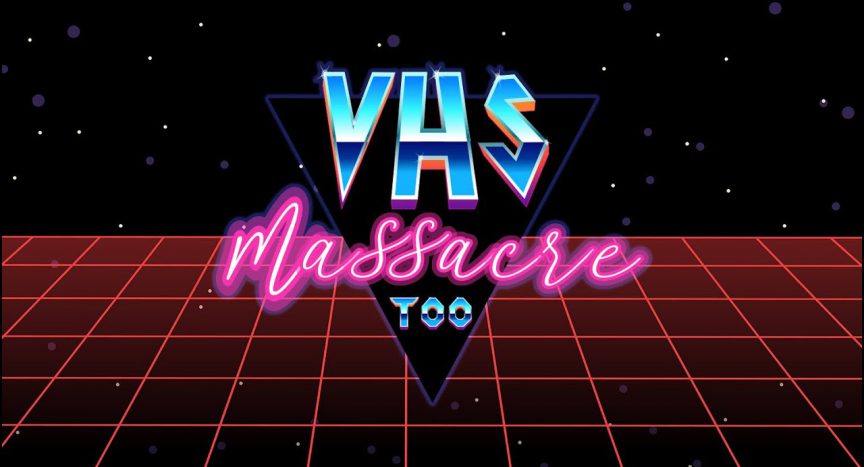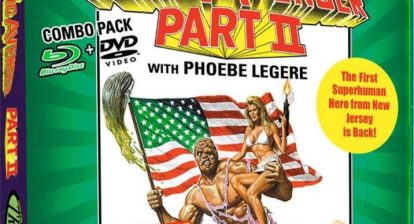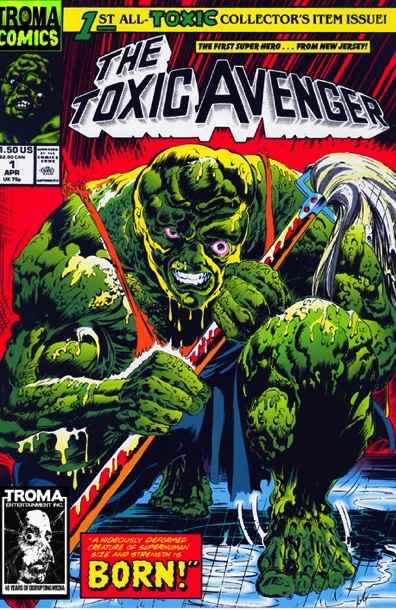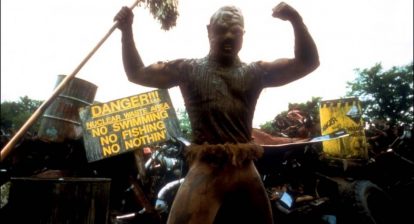Thomas Edward Seymour’s VHS Massacre Too is the second feature length documentary from the creators and friends of the popular podcast network formerly known as New York Cine Radio. The film is a direct follow up to 2016’s VHS Massacre, which was a nostalgia-filled look back at the rise and fall of VHS, and the video store owners, fan culture and outside of the studio system filmmakers who thrived at the height of the boom.
VHS Massacre Too is something of an update and continuation of the previous film, focusing on both the history and ultimate fate of exploitation fare in a modern era that is shifting away from physical media into a more streaming-based paradigm. Convenience and access are at greater heights than they have ever been before, but VHS Massacre Too posits that that convenience comes at a variety of hidden costs. With platforms acting as gatekeepers to discovery, modern exploitation and low budget cinema creators see both the integrity of their content and the payscales for that work ripped out of their hands.
Also See: Ten VHS Horror Staples You Probably Never Rented…
It’s a subject ripe for exploration, given that exploitation cinema has been both a massive moneymaker and a bastard stepchild of the industry since the earliest days of film. Joe Bob Briggs gives an excellent capsule history, from roadshows to the grindhouse golden age, then there’s a short recap of some of the previous film’s history on video stores and the influence of Blockbuster in choking out the thriving ecosystem of the VHS gold rush.
A variety of interviewees fill in different facets of the modern exploitation industry, and the difficulty of getting an uncut/unrated film in front of audiences in an era of big budget streaming platforms and “indie” studios with ties to massive conglomerates. A lot of these faces (and their topics of expertise) are very familiar to genre fans, but all of the interviews are engaging enough on their chosen subjects to still be of interest to those not already familiar with exploitation cinema.
Joe Bob Briggs provides historical context and contemporary references on how a film can get lost without physical media to carry it into the modern era. Scream queen Debbie Rochon discusses her struggles to get her film Model Hunger any distribution, eventually going into debt to do so. J.R. Bookwalter uses his long history both in filmmaking and distribution to illustrate how hard it is to get a film seen, let alone turn a profit. Lloyd Kaufman does his usual anti monopoly, anti censorship talking points, which is unsurprising considering Troma Studios is involved in the distribution of the film.
Also See: VHS Video Cover Art: the Coffee Table Book You’ve Been Waiting For
The visuals are a bit slicker than in the first flick, and there are fewer instances of wildly differing audio levels. The interviewees are well chosen for their practical knowledge of the subjects at play, and very candid in regard to their experiences. Given that this is clearly a passion project from people with a huge amount of love for exploitation and the wilder corners of low budget cinema, the slightly homemade aesthetic aspects of the documentary are actually rather charming in their larger context.
However, a late in the film segment with actor/vlogger Shawn C. Phillips is perhaps emblematic of VHS Massacre Too‘s biggest flaw. He’s discussing Cannibal Holocaust, and makes a throwaway, dismissive remark that many people won’t even watch the film, because of the animal cruelty it contains, despite it being of directional importance to genre film.
In the context of this documentary’s focus, this would have been a great time to discuss the moral panic legal accusations that Ruggero Deodato murdered his actors, or the difference in reception to Cannibal Holocaust‘s animal cruelty versus what is contained in a more mainstream film such as Apocalypse Now. Instead, we get a shallow, tired statement that treats a viewer’s desire to view animal snuff footage as some sort of litmus test to their views on genre, censorship or cinema. Then the documentary bounces on to its next subject.
Also See: Horror History: Cannibalism in Cinema
VHS Massacre Too shares this particular problem with its predecessor, in that the film tries to do too much at once, in a way that seems somewhat shallow and scattershot. The talking heads bring up great subjects that could sharpen the film’s focus on its central themes of the quiet censorship and destruction of livelihood currently impacting independent artists. Sadly, these threads are left to dangle and the topic is changed entirely.
Often, the switch is to more nostalgic material (e.g. loving closeups of rare VHS tapes or a digression on the return of Joe Bob Briggs to television) that seems out of place in an otherwise more serious cultural history. These meanders are of some interest to established exploitation film fans. However, they have little to nothing to do with the problem of physical media and the truly independent exploitation film industry’s current free fall, or the importance of preserving both.
Also See: Overlooked Exploitation Films You Need to Rediscover
There’s a lot of good source material here, from Debbie Rochon’s problems with distributors even noticing the female empowerment themes in her film, to director Jason Carvey’s profits vanishing in a fit of creative accounting when his distributor changed hands, to maybe even a more fully fleshed out discussion of legendarily controversial titles like Snuff or Cannibal Holocaust. It’s just never really utilized to its full potential
The creators of VHS Massacre Too clearly have a deep love for the films they discuss, and want creators of exploitation to have the same chance to make a living, push the limits and experiment that previous generations did. One of the documentaries’ best asides is a list of action items fans can do to assist in the goal of keeping both physical media and the fiercely independent exploitation film industry alive. The documentary just lacks the skeleton to match its enormous amount of bloody, B-cinema-loving heart. Instead of some sharper structure to really bring its larger message home, VHS Massacre Too just keeps getting distracted by the need to return some videotapes.
Wicked Rating – 6/10






